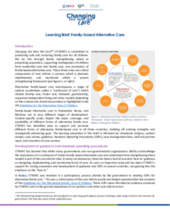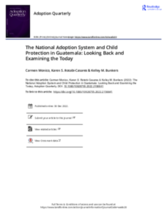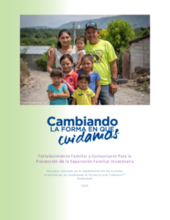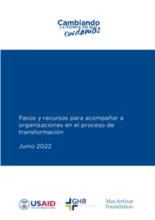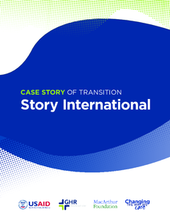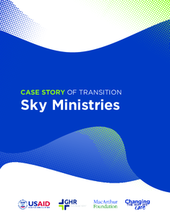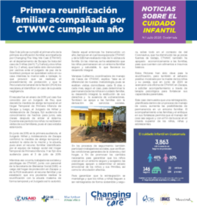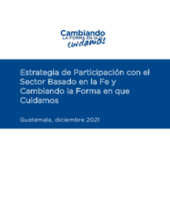This country page features an interactive, icon-based data dashboard providing a national-level overview of the status of children’s care and care reform efforts (a “Country Care Snapshot”), along with a list of resources and organizations in the country.
demographic_data
childrens_living_arrangement
children_living_without_bio
adoption
key_stakeholders
Key Stakeholders
Add New DataOther Relevant Reforms
Add New Datadrivers_of_institutionalisation
Drivers of Institutionaliziation
Add New Datakey_research_and_information
Key Data Sources
Add New DataPrevalence and number of children living in institutional care: global, regional, and country estimates
Reglamento de la Procuraduría de la Niñez y la Adolescencia de la Procuraduría General de la Nación
Revisión del gasto público asociado al cuidado de la niñez y adolescencia en Guatemala (2015 - 2019)
Acknowledgements
Data for this country care snapshot was contributed by a consultant with Maestral International and partners at Changing the Way We Care.
Displaying 31 - 40 of 161
This learning brief was developed as part of Changing the Way We Care's 2022 annual report and shares learning on family-based alternative care from Guatemala, Moldova, India and Kenya and links the reader to additional CTWWC resources on the topic.
When Eliza was a teenager, her dream was to volunteer in orphanages all over the world. So when she turned 18, she packed her bags and headed to Guatemala to volunteer in an orphanage.
This article discusses the evolution of adoption policy and practices in Guatemala from the 1990s to 2021.
Este documento se basa en la experiencia de Cambiando la Forma en Que Cuidamos (o sus siglas en inglés, CTWWC) Guatemala en procesos de fortalecimiento familiar y comunitario en un área específica de intervención.
Este documento está diseñado para orientar a las personas u organizaciones que están apoyando un proceso de transición para pasar de proporcionar atención residencial a un modelo que promueva la atención familiar y comunitaria. El documento está diseñado en torno a las Fases de la Transición de Better Care Network. Se basa en el trabajo que Changing the Way We Care ha realizado en los últimos años para apoyar a diferentes proveedores de atención residencial, tanto religiosos como laicos, en su propio proceso de transición. Hay ejemplos y enlaces a herramientas relevantes, mensajes y actividades sugeridas que pueden utilizarse para apoyar las diferentes fases del proceso.
This case story is meant to illustrate transition, the actors involved, the challenges and the success factors; recognizing that each transition is an individual process with different starting points, different dynamics and different evolutions. Story International’s transition example demonstrates the ups and downs of divesting from the orphanage model.
This case story is meant to illustrate transition, the actors involved, the challenges and the success factors; recognizing that each transition is an individual process with different starting points, different dynamics and different evolutions.
In 2021 and 2023 Changing the Way We Care (CTWWC) completed a household survey of children and caregivers, in demonstration countries Guatemala, Kenya and Moldova, to understand their experience of CTWWC services, the protective factors in their families, and the status of child well-being. Part of CTWWC’s evaluations, the resulting findings are designed to help CTWWC and other care reform actors to understand the successes and challenges of reintegration from residential care and the provision of family strengthening support.
El estudio de caso, plasmado en una página, está dirigido a posibles donantes, público interesado y actores vinculados a la reforma del cuidado infantil, que desean aprender sobre los procedimientos relacionados con el primer caso exitoso de reunificación familiar a cargo de la Iniciativa Cambiando la Forma en que Cuidamos que opera en Guatemala y además sobre el importante papel de la gestión de casos. El presente estudio de caso fue escrito en julio del 2020, un año después de la reunificación.
El presente documento pretende presentar una estrategia integral que involucre cuidadosamente al sector basado en la fe de Guatemala, con el objetivo de apoyar y promover el cambio en la forma en que el cuidado de los NNA es proporcionado por estos actores importantes y alineado con la visión de CTWWC. La estrategia está dirigida a quienes trabajen en la promoción de la transformación de servicios y el derecho a vivir en familia, y su trabajo está directamente relacionado con organizaciones basadas en la fe, es decir, directores de hogares de abrigo y protección, Obispos, sacerdotes, pastores, líderes religiosos y laicos comprometidos con el desarrollo humano integral de los NNA.

